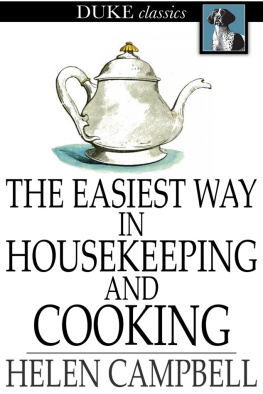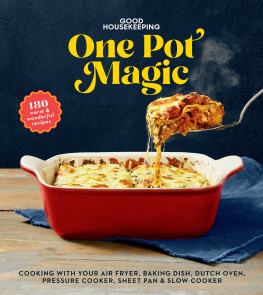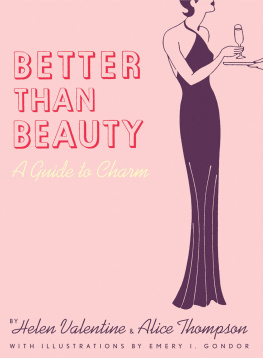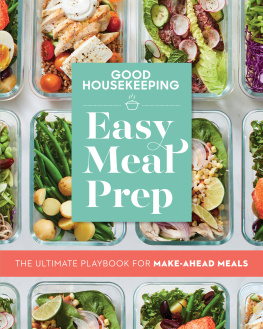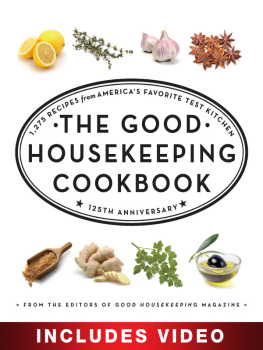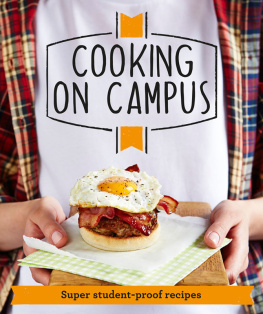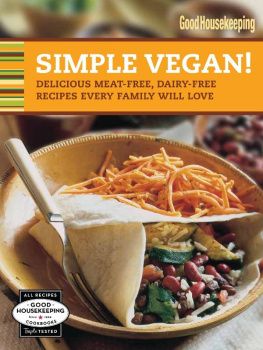THE EASIEST WAY IN HOUSEKEEPING AND COOKING
ADAPTED TO DOMESTIC USE OR STUDY IN CLASSES
* * *
HELEN CAMPBELL
*
The Easiest Way in Housekeeping and Cooking
Adapted to Domestic Use or Study in Classes
First published in 1893
ISBN 978-1-62013-596-9
Duke Classics
2014 Duke Classics and its licensors. All rights reserved.
While every effort has been used to ensure the accuracy and reliability of the information contained in this edition, Duke Classics does not assume liability or responsibility for any errors or omissions in this book. Duke Classics does not accept responsibility for loss suffered as a result of reliance upon the accuracy or currency of information contained in this book.
Contents
*
Preface to Revised Edition
*
The little book now revised and sent out with some slight additions,remains substantially the same as when first issued in 1880. In the midstof always increasing cookery-books, it has had a firm constituency offriends, especially in the South, where its necessity was first madeplain. To enlarge it in any marked degree would violate the original plan,for which the critic will please read the pages headed "Introductory,"where he or she will find full explanation of the growth and purpose ofthe book. Whoever desires more receipts and more elaborate forms ofpreparation must look for their sources in the bibliography at the end,since their introduction in these pages would practically nullify thetitle, proved true by years of testing at the hands of inexperiencedhousekeepers, whose warm words have long been very pleasant to the authorof "The Easiest Way."
NEW YORK, June, 1893.
Introductory
*
That room or toleration for another "cook-book" can exist in the publicmind, will be denied at once, with all the vigor to be expected from apeople overrun with cook-books, and only anxious to relegate the majorityof them to their proper place as trunk-linings and kindling-material. Theminority, admirable in plan and execution, and elaborate enough to serveall republican purposes, are surely sufficient for all the needs that havebeen or may be. With Mrs. Cornelius and Miss Parloa, Marion Harland andMrs. Whitney, and innumerable other trustworthy authorities, for allevery-day purposes, and Mrs. Henderson for such festivity as we may attimes desire to make, another word is not only superfluous but absurd; infact, an outrage on common sense, not for one instant to be justified.
Such was my own attitude and such my language hardly a year ago; yet thatshort space of time has shown me, that, whether the public admit theclaim, or no, one more cook-book MUST BE. And this is why:
A year of somewhat exceptional experiencethat involved in building upseveral cooking-schools in a new locality, demanding the most thoroughand minute system to assure their success and permanenceshowed theinadequacies of any existing hand-books, and the necessities to be met inmaking a new one. Thus the present book has a twofold character, andrepresents, not only the ordinary receipt or cook book, usable in any partof the country and covering all ordinary household needs, but covers thequestions naturally arising in every lesson given, and ending instatements of the most necessary points in household science. There arelarge books designed to cover this ground, and excellent of their kind,but so cumbrous in form and execution as to daunt the average reader.
Miss Corson's "Cooking-School Text-Book" commended itself for itsadmirable plainness and fullness of detail, but was almost at once foundimpracticable as a system for my purposes; her dishes usually requiringthe choicest that the best city market could afford, and taking forgranted also a taste for French flavorings not yet common outside of ourlarge cities, and to no great extent within them. To utilize to the bestadvantage the food-resources of whatever spot one might be in, to giveinformation on a hundred points suggested by each lesson, yet having noplace in the ordinary cook-book, in short, to teach household science aswell as cooking, became my year's work; and it is that year's work whichis incorporated in these pages. Beginning with Raleigh, N.C., and lessonsgiven in a large school there, it included also a seven-months' course atthe Deaf and Dumb Institute, and regular classes for ladies. Straightthrough, in those classes, it became my business to say, "This is noinfallible system, warranted to give the whole art of cooking in twelvelessons. All I can do for you is to lay down clearly certain fixedprinciples; to show you how to economize thoroughly, yet get a betterresult than by the expenditure of perhaps much more material. Before ourcourse ends, you will have had performed before you every essentialoperation in cooking, and will know, so far as I can make you know,prices, qualities, constituents, and physiological effects of every typeof food. Beyond this, the work lies in your own hands."
Armed with manuals,American, English, French,bent upon systematizingthe subject, yet finding none entirely adequate, gradually, and in spiteof all effort to the contrary, I found that my teaching rested more andmore on my own personal experience as a housekeeper, both at the South andat the North. The mass of material in many books was found confusing andparalyzing, choice seeming impossible when a dozen methods were given. Andfor the large proportion of receipts, directions were so vague that only atrained housekeeper could be certain of the order of combination, orresults when combined. So from the crowd of authorities was graduallyeliminated a foundation for work; and on that foundation has risen astructure designed to serve two ends.
For the young housekeeper, beginning with little or no knowledge, buteager to do and know the right thing, not alone for kitchen but for thehome as a whole, the list of topics touched upon in Part I. becameessential. That much of the knowledge compressed there should have beengained at home, is at once admitted: but, unfortunately, few homes giveit; and the aim has been to cover the ground concisely yet clearly andattractively. As to Part II., it does not profess to be the whole art ofcooking, but merely the line of receipts most needed in the averagefamily, North or South. Each receipt has been tested personally by thewriter, often many times; and each one is given so minutely that failureis well-nigh impossible, if the directions are intelligently followed. Afew distinctively Southern dishes are included, but the ground covered hasdrawn from all sources; the series of excellent and elaborate manuals bywell-known authors having contributed here and there, but the majority ofrules being, as before said, the result of years of personal experiment,or drawn from old family receipt-books.
To facilitate the work of the teacher, however, a scheme of lessons isgiven at the end, covering all that can well be taught in the ordinaryschool year: each lesson is given with page references to the receiptsemployed, while a shorter and more compact course is outlined for the useof classes for ladies. A list of topics is also given for school use; ithaving been found to add greatly to the interest of the course to writeeach week the story of some ingredient in the lesson for the day, while aset of questions, to be used at periodical intervals, fixes details, andinsures a certain knowledge of what progress has been made. The coursecovers the chemistry and physiology of food, as well as an outline ofhousehold science in general, and may serve as a text-book wherever suchstudy is introduced. It is hoped that this presentation of the subjectwill lessen the labor necessary in this new field, though no text-book canfully take the place of personal enthusiastic work.

